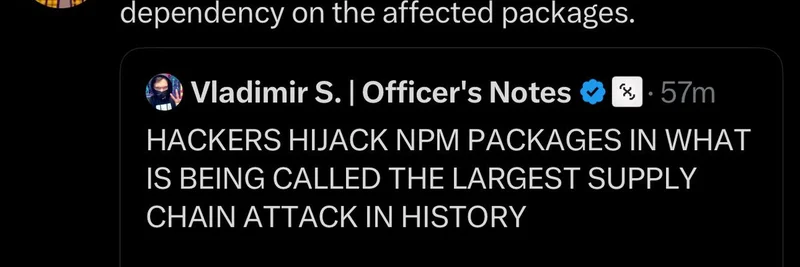Hey folks, if you're deep into the Solana ecosystem, especially chasing those wild meme token rides, you've probably heard the buzz about the massive NPM supply chain attack that hit on September 8, 2025. It's being dubbed the largest in history, with hackers compromising popular JavaScript packages that rack up billions of downloads weekly. But here's the good news for Solana users: Kamino Finance, one of the top lending protocols on the chain, has confirmed they're not affected. Let's break this down, explain what it all means, and why it's a big deal for meme token enthusiasts.
First off, what's a supply chain attack? In simple terms, it's when bad actors sneak malicious code into trusted software components that developers use to build apps. In this case, attackers phished a reputable developer's NPM account—NPM stands for Node Package Manager, the go-to hub for JavaScript libraries. They injected sneaky malware into packages like debug, chalk, strip-ansi, and others that power everything from web apps to crypto dApps. This malware is nasty: it swaps out crypto wallet addresses in real-time during transactions, potentially draining funds without you noticing. It targets major chains including Bitcoin, Ethereum, Solana, and more. Reports from sources like BleepingComputer and Cointelegraph detail how over 2.6 billion weekly downloads were at risk, making this a web3 nightmare.
Now, enter the tweet from SolanaFloor that sparked this discussion. They shared a update highlighting a response from Kamino Finance co-founder Marius ( @y2kappa ), who quoted a warning from Vladimir S. about the hack. Marius assured everyone that the Kamino app doesn't rely on any of the compromised packages. For context, Kamino is a powerhouse in Solana DeFi, handling lending, borrowing, and liquidity—stuff that's crucial for meme token strategies like leveraging positions or farming yields.
Why does this matter for meme tokens? Solana is meme token heaven, with projects launching daily and traders jumping in via dApps. Many of these interfaces could indirectly use those tainted NPM packages, putting your SOL or meme bags at risk if you're not careful. If a dApp you're using for a quick pump got infected, that address swap could turn your profit into a hacker's payday. But with Kamino giving the all-clear, it's a sigh of relief for DeFi users who integrate meme tokens into their plays—think borrowing against your holdings to ape into the next big thing without worrying about this specific vuln.
That said, the broader crypto community is on high alert. Ledger's CTO, Charles Guillemet, warned in a viral post (shared over 6,000 times) that if you're not using a hardware wallet like Ledger, hold off on on-chain transactions. Even with hardware, double-check every detail before signing. Other protocols like Suilend on Sui have also confirmed they're safe, but the attack's scale—detailed in analyses from Upwind and Enterprise Security Tech—shows how interconnected web3 is. For meme token hunters, this underscores the need for vigilance: stick to audited dApps, use hardware wallets, and keep an eye on real-time updates from sources like X or security firms.
At Meme Insider, we're all about equipping you with the knowledge to navigate these choppy waters. This incident highlights why understanding tech news is key to leveling up as a blockchain practitioner. Stay safe out there, and remember, in the world of memes and DeFi, security isn't just a buzzword—it's your edge. If you've got thoughts on how this affects your Solana plays, drop them in the comments!



